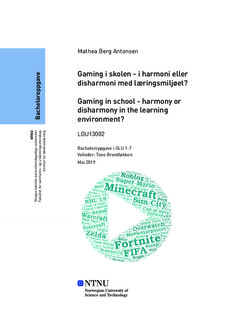| dc.description.abstract | Gaming i skolen - i harmoni eller disharmoni med læringsmiljøet?» tar utgangspunkt i temaet gaming og læringsmiljø for å se på hvorvidt en fritidsaktivitet kan påvirke læringsmiljøet på skolen. Oppgaven inngår i emnet Pedagogikk og elevkunnskap 4, og derfor ligger tyngdepunktet på de skolerelevante sidene ved gaming. Jeg har spisset en problemstilling for å avgrense det store temaet, og har dermed endt opp med følgende problemstilling: «Hvordan påvirker gaming læringsmiljøet?». Det har blitt foretatt en spørreundersøkelse på et mellomtrinn med 175 respondenter.
Det teoretiske grunnlaget i denne bacheloroppgaven er blant annet fra Overå (2015), Brunborg, Mentzoni og Frøyland (2013) om dagens unge og gaming. Videre har jeg brukt teorier om læringsmiljø fra Imsen (2016), Postholm (2013), Tetzcnher (2012) og Keenan, Evans og Crowley (2016), samt styringsdokumentene fra Utdanningsdirektoratet. Undersøkelsen ga resultater som indikerer at gaming ikke påvirker den generelle trivselen i stor grad, men det påvirker læringsmiljøet ved at det er en ny arena for sosialisering. Dermed er det forholdene som vennskap og det sosiale fellesskapet som blant annet har blitt påvirket. Dette kan forklares ved at det er guttene som spiller dataspill som har flest venner. Gamerkulturen står sterkt i utvalget, til tross for jevn fordeling av gamere og ikke-gamere. Likevel er ikke normene og verdiene til utvalget påvirket, det kan heller være den aktuelle læreren sin klasseledelse sin fortjeneste.
| |
| dc.description.abstract | This bachelor thesis is based on the theme of gaming and the learning environment to investigate whether a recreational/free time activity can affect the learning environment in school. The thesis based in the course Pedagogikk og elevkunnskap 4, and therefore its focus lies on the parts of gaming which is relevant to school. I have narrowed the thesis question in order to narrow in this big subject and ended up with the following thesis statement: “how does gaming affect the learning environment?”. A survey has been conducted between year 5 and 7 with 175 respondents.
The theoretical basis for this bachelor thesis comes from, among others, Overå (2015), Brunborg, Mentzoni and Frøyland (2013) which discusses today’s youth and gaming. Furthermore, the theory of learning environment comes from Imsen (2016), Postholm (2013), Tetzcnher (2012) and Keenan, Evans and Crowley (2016), as well as steering documents from the Norwegian Directorate of Education and Training. The survey concluded that gaming does not affect the general well-being in any major way, but it does affect the learning environment because of it being a new arena for socializing. Factors like friendships and the social communities which, among other things, was affected in the sense that the boys who plays video games are the ones with the most friends. The gamer culture is well represented in the survey’s population, despite an even divide between gamers and non-gamers. Despite this, the norms and values of the population was unaffected, which might be due to this particular teacher’s class leadership. | |
